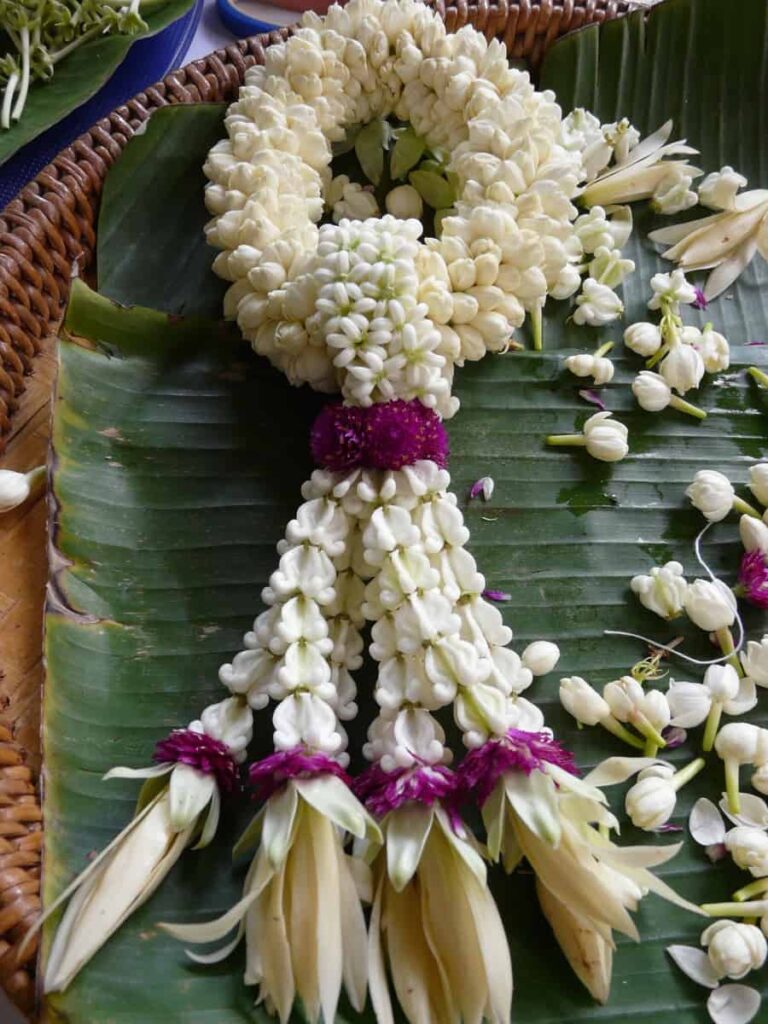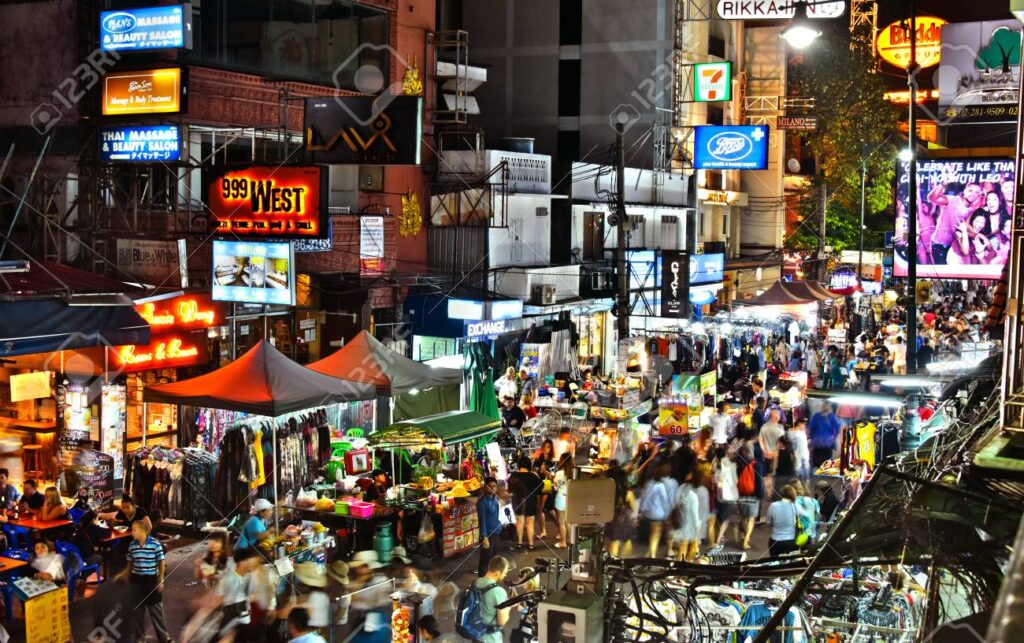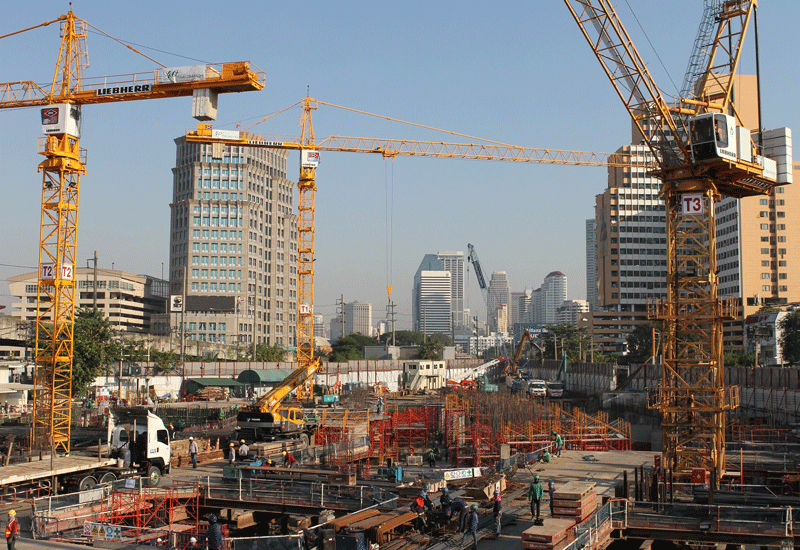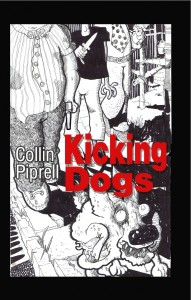This week Mu finds a white hair on Jack’s head, and he thinks it might come from writing brochure copy for Fat Fat.
Selections from Arno Petty’s Intelligencer and Weekly Gleaner
- BUT DON’T HOLD YOUR BREATH. Tests show there are now three more intersections in the city where it is a good idea not to breathe. Not to worry, though: in ten years or so the planners hope things might improve a little and we will all be able to take a sip of air to see how things are going.
- GOOD NEWS OR BAD NEWS? Pollution has been democratized. Now that Bangkok has become a ‘heat island,’ the hot air rises and carries pollutants up to where even the occupants of penthouses are exposed to the noxious gases that can penetrate air-conditioning systems.
- WHAT’S THAT YOU SAY? What do Bangkok traffic cops and dogs have in common? They can’t hear a dog-whistle. Recent tests have shown that 23% of our traffic policemen have suffered significant hearing loss; this is blamed mostly on the masses of unmuffled two-stroke motorcycles scrambling at the intersections. Meanwhile, it has been determined that Bangkok dogs don’t come when you blow a dog-whistle. Why? They’re deaf to the higher frequencies.
- BAD COUPS IS GOOD NEWS. While we wait to see whether we go deaf or die of a lung disease first, there are these rumors of a coup. Of course there are always rumors of a coup in Thailand; but this rumor is one supported by Izzy Scoop, and that makes me nervous. Mind you, such things can be good for business if you are a freelance writer.
For once my newspaper got to me before somebody turned it into artificial roses or take-away bags for pork satay.
But then I didn’t know whether this was a good thing after all. It was nothing but the usual: rumors of coups, predictions of floods, everybody accusing everybody else of being corrupt, and the price of beer was going up again.
And if ever I got tired of worrying about the news, then I could always read my mail.
The phone bill included seven calls to Satun and twelve to Udon Thani. What the hell was anybody doing calling Udon Thani? Where the hell was Udon Thani, come to that? Worse than phone bills, there was this letter from Esther, my old childhood affliction back in Peoria, a lady who had been some part of the reason I left the States in the first place.
“I’ve been talking to your mother, Jack, and she thinks it’s a good idea if we come to Bangkok to see you.” This came right after where she told me how much she missed me, why didn’t I write, and wasn’t it awfully hot over there in Thailand?
“This girl Esther, Jack — why does she still write to you?” Mu wanted to know. She was tapping a front tooth and gazing away into the distance.
“Mu,” I said, “that’s all over with. I don’t know why she still writes to me. Maybe my mother makes her do it. My mother wants me to marry her.”
Mu gave one last decisive, clearly audible tap and said this: “You should go back to this girl, Jack. I want you to leave. Go back to her. Go home.”
All this was delivered in a flat, hard voice. Her face was turned away from me. I reached to touch her hair. “Look at me, Mu.” I held her chin and turned her face towards me to see tears in her eyes.
“Go home, Jack. You don’t belong here.”
This came as a shock to me, even though I didn’t believe Mu really meant it. It was just that she was under a lot of pressure.
You want to think, you need to unwind, the thing to do is take a long walk. You want to do these things, the place not to do them is this big market area down the river from where I lived, one of the most densely populated places on the planet. But I guess I was testing myself. Testing and training myself both. For Mu. And for me. She could have been right — it might have been I needed to change my ways. Maybe just a little. If I wanted to live and prosper in Thailand, that is.
But persuasive circumstances were arguing it was time to take my leave of the country altogether. For one thing, it was hard not to get this feeling that lately I was stumbling along always one step away from sudden death or worse. I didn’t even know for sure just who all were gunning for me, which I admit was preying on my mind somewhat. Meanwhile both my girlfriend and my good buddy Hip kept telling me I was basically a moron when it came to getting along in this life. And now Mu was also telling me she didn’t want me around the joint; I should go back to the U.S. of A. and marry one reason I left that country in the first place.
On top of that, and even if some of this was to blow over, finally, things had gotten to the stage where I would have to make up my mind what I was going to do about Mu. Marriage to Mu. Now that was something to think about. Mu with the cousins beyond number. Mu whose business dealings, if they didn’t land us all in jail, could some day leave her bigger than General Motors. Mu who had strong, I won’t say dogmatic, ideas about the way any man of hers should behave, what was correct conduct and so on. Mu who believed in ghosts everywhere, who laid out more on astrologers every month than I spent on Camembert cheese only so she could figure out whether it was an auspicious time to pay the bills or not.
It could be Mu was right. Maybe I didn’t belong here. It could be nobody belonged in Bangkok, the way things were going. But I had a choice. Didn’t I? I could go back to the States and start over again. Why not? On the other hand, Mu had said this whole business, Bia getting snatched and all, was my fault. Maybe it was at that; and if it was, then you could say I had a responsibility to help fix things. Even if it wasn’t really my fault, it could be I had this responsibility.
I was trying to breathe deeply and regularly, something which is hard to do when, one, you are pissed off and, two, you are trying to minimize your intake of exhaust fumes from the slow torrent of buses, cars, and tuk tuks crawling the street. I was counting each inhalation and exhalation, trying to turn my attention in on the simple business of respiration, in on the odd numbers and out on the even. Mindfulness.

An incredible mass of humanity spilled off the sidewalks onto the road; people moved every which way, eddying around the traffic and the innumerable street stalls. There were vendors selling fruit, selling clothes, selling watches, costume jewelry, cleaning sponges, toothpicks, and second-hand shoes. There was food — all manner of tasty things steaming and sizzling and boiling and smoking, aromas and stinks and scents and, suddenly, a burst of fragrance from a klatch of girls sitting on the pavement stringing garlands of jasmine buds. The vendors were stacked three deep across the sidewalks, so you couldn’t make much headway there. If you were in a hurry you had to walk on the street, except that the street was so jammed with other people in a hurry you could hardly move. So there was no place for the cars, of which there would already have been too many even without any people. You could say it was crowded.

The blind street band on the corner was going full blast, the faces of the musicians filled with a quiet intensity, an innocence and vulnerability, a sweetness of expression found only in saints and the blind. Their instruments and amplifiers were set up right in the middle of this hubbub, an unholy clamor of drums and guitars and electric organ and some love song squalled into microphones fifty feet from where a tape vendor was playing classical Pink Floyd at maximum volume. Not for the first time, I wondered if the blind band weren’t also deaf. They used to get twenty baht a week off me, on average, till I learned they were run by petty hoods who probably skimmed off most of my contributions for themselves.
A pickup truck full of rambutans was meanwhile blaring the day’s prices from a PA system mounted atop the cab; and a kid was hawking blue jeans using an electric bullhorn. Right in my ear, he was doing this.
“Do not feel pissed off,” I told myself. “Jai yen yen. Be cool.” I breathed in and out and counted. “Do not be pissed off.” And I strode on, pissed off.
I strode into a gaggle of ladies who stopped right in front of me to have a chat. “Excuse me, please; holy shit,” I muttered as I squeezed through. “Kaw thoht, krap; Jesus Christ.”
Thais amble. Furthermore there is no pedestrian traffic pattern whatsoever. Everybody moves with this timeless kind of deliberation, much like upcountry oxcarts, managing nevertheless to be right in front of me no matter where it is I am going.
The problem was, I couldn’t get the hang of ambling. Even in the heat and humidity, I couldn’t amble. My standard procedure was to look ahead, choose a trajectory, and steam on. That was the way things were done, back in America. And no amount of mindfulness or regular breathing seemed to do anything to lessen the habit.
And when people veered directly in front of me or stopped abruptly to mill about in impromptu roadblocks I got pissed off. I couldn’t help it. Though I realized I shouldn’t do this thing.
“Don’t get angry,” Mu would tell me. “If you act like that, you give power over yourself to others. The way to do is hold back and watch. You see what the other is doing and why. And you show none of yourself. You wait. Never act from emotion, especially with Thai people. Watch and see, and then do what you decide they want to see or what you want them to see. Don’t show yourself.”
If you weren’t in control of your own temper, then you were never in control of the situation, whatever it might be. So getting angry was only hurting yourself, leaving yourself open to trouble. Second, I had to ask myself sometimes: Why the hurry? Take this day, for example — all I was doing was going for a walk to straighten out my thinking on a few matters. What difference did it make how far I got and how fast? I wasn’t going anywhere; I was just going. So why not relax and enjoy it? Third, this was Thailand, as Mu kept pointing out, and these people were Thais, walking in the Thai way. They were right, and I was wrong. If I wanted to walk in my way and not find every sidewalk and street an obstacle course, then I should go and walk in Peoria or someplace. This was probably part of what Hip meant when he said I was always doing the Funky Chicken in the middle of the Thai waltz.

“You! You!” A couple of the passers-by were addressing me.
So I tried to slow down. I counted and I breathed. And I swore under my breath and sweated. Not for the first time, it occurred to me that maybe Mu was right. And Hip. Maybe I wasn’t cut out for life in Asia. At that moment, a phalanx of uniformed schoolgirls materialized in front of me, causing me to swerve to the side. And as I did do, I was brought to a sudden halt by a stab of acute pain. I had swerved right into this metal street sign which was mounted too low to take account of tall farangs. The corner of the sign had grazed my head, edge-on, just enough to almost lobotomize me.
I felt a trickle of what turned out to be blood run down from my scalp. I smiled at everybody, showing none of myself, and I said “Mai pen rai. For Christ’s sake. Hey, no problem.” Some looked relieved and others looked disappointed, and none of them paid any more attention, except for the pineapple vendor who offered me a wad of tissue paper. I strode on, dabbing at my crown and wondering if I needed a tetanus shot.
Back in the States I could walk around and never think that my blood pressure, never mind any street sign, was about to lift the top of my head off. Nobody back there was threatening to kill me, kidnapping me and my friends every time I turned around. And it wasn’t so hot. And you could go for walks without your chest starting to hurt, the way mine was now; if this air got any worse, we’d soon all be dead already and the gunmen could go to the beach and relax.
It was no doubt harder to make a living as a writer back in the States. But what was I writing here, when it came down to it? I was flirting with terminal hack-writerdom. And to make things worse, I was now on Fat Fat’s payroll.
Mu had found a white hair on me only the week before. I was too young for white hairs, she told me; and she was right. This was from writing brochures, I claimed. Though I had to admit it: Fat Fat and his crew scared me silly, and possibly it was them turning my hair white as well. Any thought of going back to Luckyland filled me with very bad feelings indeed.
It might be best for all concerned, I had to think, if I split. If I wasn’t around to piss Fat Fat off, maybe he would just let Bia go. She hadn’t done anything to him, after all. And he had no reason to hurt Mu or anybody else.
I wasn’t much use to Mu or anybody anyway. She was the one doing all the planning with Willie and Tommy and even Hip. They could speak Thai in a way I couldn’t, for one thing.
“Anyway,” I told myself aloud, getting some interested glances from the passers-by, “You’re only a babe in the woods.” I didn’t understand the Thai Way; I was going to get us all killed. It was better if I left Thailand and let the experts get on with it.
And the pollution. Here I had been walking for less that half an hour, and there was this tightness in my chest. Though whether this was air pollution or intimations of still more acute forms of lead poisoning it was hard to say.
So I bought a pack of cigarettes. I smoked as I walked. I smoked and thought about radioactive isotopes and how I had read that hydrocarbons from exhaust emissions settle on the glowing end of a cigarette and turn into radioactive isotopes which accumulate in your lungs and throat and eventually give you cancer. And ever since my pipe got shot I had been smoking cigarettes like a demon. Even if you didn’t smoke, you inhaled the equivalent crap of two or three packs a day, with this traffic. So what the hell. So mai pen rai, right?
I was oppressed by more than the tightness in my chest, though. There was the crassness, the constant throb of greed and carelessness in the air. Driven by Singapore penis envy, the construction boom had concrete and glass monstrosities thrusting up on all sides, the cranes like huge metal stick insects come down to earth to refashion the environment according to some alien ideal of what is appropriate.
There was this constant element of impermanence; you never knew what the city was going to look like from one week to the next. And over there across the road was that great big supermarket. They broke every article in the building code putting that up. Now it sold rotting vegetables, stale eggs and stale bread yet at the same time charged higher prices than anywhere in town. The open market had had far fresher produce at better prices, but as of a few months before it had been removed to make way for the multi-storey parking garage which was needed to service the new supermarket and the adjoining department store. This was what you called progress.

Buildings kept rising on all sides higher and higher till there was no breeze left to blow away the smog, and the concrete and glass had already turned Bangkok into a simmering heat island three degrees hotter than its surroundings. Meanwhile the old community life in the streets — the sidewalk restaurants and shops open on the street — were being progressively closed off by the air-conditioned malls and boutiques and the traffic. Land kept doubling in value every year, appreciating so fast you could sometimes feel it shudder with delight right under your feet. Rents were going up to the point ordinary people had nowhere to live anymore. And the background to everything was the noise, the incredible noise.
Of course that time I went back to the States for a visit, I had missed it all. The streets had seemed like sets from some science-fiction movie where the city had been evacuated. It was so quiet it gave me the creeps; and it had taken me two weeks to start feeling homesick for Bangkok. You figure it out.
I felt calmer when I got home. Or maybe I was only tired.
The opinion of the working committee was now that I should instead lie low until the master plan was ready. It might simply complicate matters to have me in Luckyland before they knew how we were going to proceed. Though it could turn out, if Hip’s sources couldn’t come up with the information we needed, I’d have go back to Luckyland and case the joint a bit more. For now, however, it was best to hide out at Hip’s place.
Mu, on the other hand, wanted me to go to ground till the whole thing was over. She didn’t think I ought to get involved with things any more than I was already, being a babe in the woods the way I was. “Go back home. Go to the United States and live with Esther,” is what she told me.
And I had to think this might not be such a bad plan, except the part where I got to live with Esther; though I knew Mu didn’t really mean it.
But I never had a chance to run for the States; I never got to lie low. I never even managed to hear any of the Plan. That very evening I was walking back to the apartment to get some clothes so I could move in with Hip for awhile, when I saw Big Lek the somtam lady waving and carrying on in the soi. When I got close enough to see what was up, I realized she had been trying to tell me to run for it.
Fun and Co. were waiting to take me for another ride. This time they didn’t bother putting a bag on my head, which gave me the idea they didn’t care if I knew where I was going or not, which in turn gave me the idea I might be in some trouble.
And I was right.
.
Next week we get Fat Fat’s live show, and Jack finds Bia.


